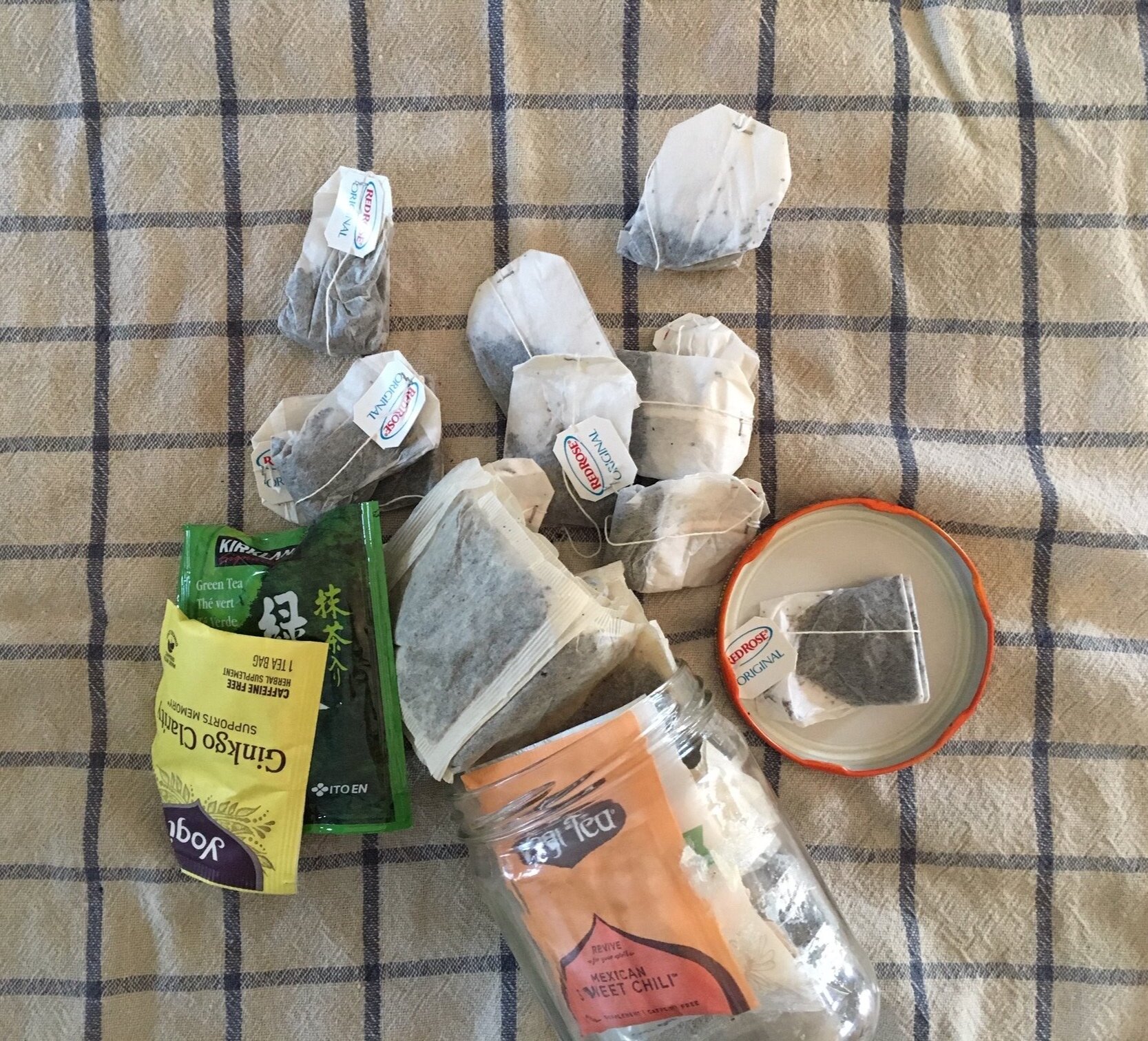At this point in your Zero Waste Journey you might be getting pretty adept at avoiding the major plastic and waste items. Plastic bags, plastic straws and single use water bottles are among some of the easier, more obvious, single use waste generators to avoid. Some items we have identified, like tetra-paks, to go coffee cups, disposable bathroom items might be less obvious and took us more time to root out of our lives. These items may be harder to give up completely.
Having become used to avoiding these two categories of waste, we have to move on to the next step. Time to level up in our zero waste journey and learn to avoid the more hidden plastic in our day to day lives.
Moving to the next step definitely involves more research and attention to detail. Reading labels, identifying what other names plastic goes by, and making sure to weed out hidden plastic items that we already own will take work.
I’m not much a tea drinker, so it’s taking me a while to get thru these old tea bags. When I use one, I rip it open, put the leaves in the compost and throw away the bag that contains plastic.
Here are some items you might not know contain plastic:
Kraft or paper looking to go containers - similar to to-go cups, these seem like paper, but are lined with plastic cannot be recycled or composted. Don’t be fooled! Bring your own togo container, or choose take out that use non coated containers.
Most clothing - polyester, acrylic, and nylon, are all plastic fibers. try to avoid them. Check labels, and try to buy only natural fibers. You don’t have to donate or throw away the clothes you love that contain plastic, but get a micro plastic catching bag to wash the plastic items you have already in your wardrobe.
Tea bags - almost all tea bags have plastic in them. Get loose leaf tea to avoid worrying about it!
Tampons and other menstrual products - tampons and pads are mostly made from or packaged in plastic. There are many alternatives, like menstrual cups, period underwear and reusable pads.
Disposable masks - these may seem like cloth but they are actually mostly plastic and will break down to micro plastics that will get into the soil, sea and air. These and other disposable PPE are quickly becoming the fastest growing litter on land and in the ocean. Use reusable cloth mask to protect yourself and others!
These are only a few examples of everyday hidden plastics. Are there others you know of and avoid? Share them in the comments!
I try to avoid take out, but sometimes we do end up getting something to go in a box lined with plastic. I wash these out and reuse them as much as possible.
If you are new to this series, here’s what we are working on for this 6 moth block. Follow along or pick and choose challenges to try:
June 2020- Say NO, Say Yes
PLASTIC FREE JULY
August 2020 - Carry No Disposables
September 2020 - back to school/educate
October 2020 - Beach clean
November 2020 - Hidden plastic
December 2020 - Repair before you replace
We started our tackling new zero waste challenges six months at a time in 2019:
January 2019 - Trash Audit
We separated and looked our trash to see what we are throwing away and what we can reduce.
February 2019- Declutter Everything
We went thru what we have to declutter and reduce.
March 2019- Switch to Paper
This month we moved to paper to get one step closer to reusables.
April 2019- Compost
Composting is an easy way to reduce food waste and prevent it from reaching the landfill.
May 2019- Meatless Monday
One of the best ways to improve the environment is to stop eating factory farmed meat and industrial fish. Small steps lead to big change so this month we gave up meat (or dairy or fish) for at least one day.
June 2019- No Bottled Water
We gave up bottled water as an avenue to give up more disposable plastic in Plastic Free July.
July 2019 - Plastic Free July!
Go plastic free this month!
In late 2019, we continued our journey to becoming more zero waste:
November 2019 - Zero Waste Kit
We created a zero waste kit to help us be more zero waste in our day to day life.
December 2019- No Gifts
We took Dec to give no gifts and get no gifts.
January 2020 - Clothing and Fast Fashion
This month we explored what fast fashion is, and how we can stop buying it forever.
February 2020- Use Mass Transit
The shortest month seemed like a good time to explore alternatives to driving our cars.
March 2020 - Bathroom Make-over
You’ve swapped out a few items to more sustainable choices around the house. It’s time to tackle a full room.
April 2020- Grow Your Own Food
April marks the start of spring in the continental USA, and when we can start growing food easily. But there are many ways and time to grow your some of own food.

